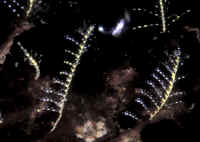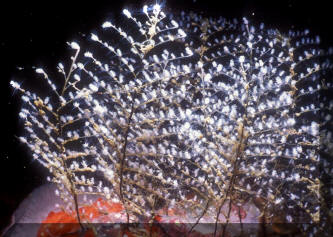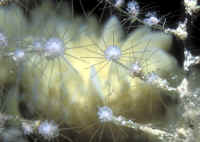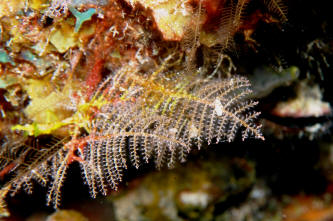|
Related FAQs: Hydrozoans, Hydrozoans 2, Hydrozoan Identification,
Hydrozoan ID 2, Hydrozoan ID 3, Hydrozoan ID 4, Hydrozoan ID 5, Hydrozoan ID 6, Hydrozoan ID 7, Hydrozoan ID 8, & Hydrozoan Behavior, Hydrozoan Compatibility, Hydrozoan Selection, Hydrozoan Systems, Hydrozoan Feeding, Hydrozoan Disease, Hydrozoan Reproduction,
Medusoids/Jellies (Ctenophores, some Hydrozoans,
Scyphozoans): Jelly Identification, Jelly Behavior, Jelly Compatibility, Jelly Selection, Jelly Systems, Jelly Feeding, Jelly Disease, Jelly Reproduction, Fire Corals,
Lace
Corals, Stinging-celled Animals
Related Articles: Cnidarians, Fire
Corals, Stylasterines, Hydrozoan Jellies,
Water Flow, How Much is Enough,
Not Corals! But Still Stinging-Celled
Animals: The Hydrozoans, Part 3
To:
Part 1, Part 2,
Part 4
|
|
| by Bob Fenner |
|
Genus Pennaria:
| Pennaria disticha Goldfuss 1820.
Cosmopolitan in tropical, temperate seas. To 12 cm. in height. Urn-shaped
polyps are born on upper sides of immediately alternating branches. N.
Sulawesi and Nuka Hiva, Marquesas images. |

|
Bigger PIX:
The images in this table are linked
to large (desktop size) copies. Click on "framed" images
to go to the larger size. |
|

|
Genus Ralpharia:
| Ralpharia gorgonia, Solitary Gorgonian
Hydroid. Size: 1/4-1 in. diameter. Singular pink to white polyps with thin, clearish
tentacles. Usually found attached to sea fans, particularly Sea Plume tips
(Pseudopterogorgia). Cozumel pic by Di. |

|
Bigger PIX:
The images in this table are linked
to large (desktop size) copies. Click on "framed" images
to go to the larger size. |
|
%20MD.JPG)
%20MD.JPG)
|
Genus Sertularella:
| Sertularella speciosa, Branching
Hydroid. Branches alternate in single plane per stalk, with white polyps
alternating. Mostly 1", but up to several inches in length in places. Solitary or colonial;
found in caves or attached to underhangs. Worldwide in tropical seas. At right in the Grand Turks. |

|
Genus Thyroscyphus:
|
Thyroscyphus ramosus, the Algae Hydroid. Uneven
alternately arrayed branches, often covered by algae. "Clean" in St.
Lucia, and more typical appearance in Belize and a close-up in Cozumel.
|
To:
Part 1, Part 2,
Part 4
|
|

